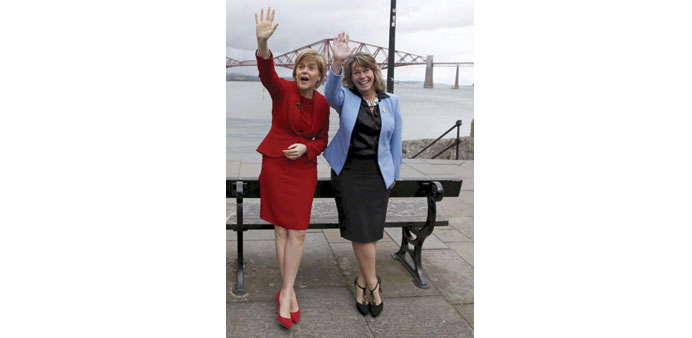Nicola Sturgeon, the leader of the Scottish National Party, poses with local candidate Michelle Thomson during a campaign visit in South Queensferry, Scotland.
Reuters/London
One hundred of the wealthiest political donors in Britain used a little-known tax loophole to give at least £39mn to the four biggest political parties, a Reuters analysis has found.
The donors included more than a dozen lawmakers. Reuters is the first to measure the loophole, which offers political parties - and in some cases, individual politicians or their families - an unintended gift from the taxpayer.
Political donations made by individuals are not tax-deductible in Britain. If a donor earns a salary or takes a dividend and then donates it, they will pay income tax on it before they can donate it. But accountants say giving from a company that they control lets the donor avoid paying income tax. The mechanism enables donors to give more than they otherwise might.
The analysis comes as politicians campaigning in a May election have pledged to fight tax avoidance.
The ruling Conservative Party says it will clamp down on “aggressive tax avoidance,” while Labour’s plans include a review of the British tax authority. The Liberal Democrats and the United Kingdom Independence Party (UKIP) also say they will target tax dodging.
The amount given through private firms equals about one-tenth of all donations to the four main parties, but the actual figure could be much higher since corporate donors don’t have to name their controlling or significant shareholders.
Among those to benefit from the loophole have been Health Minister Jeremy Hunt, a Conservative, and Lord Alan Sugar, a Labour donor and host of “The Apprentice,” a television series on entrepreneurship. Both men gave through companies: Hunt, through a company which names him as a principal shareholder, Sugar, through a firm he owns outright.
A spokesman for Hunt said: “It’s not unusual for companies to make donations to MPs and all of these donations were properly and transparently declared to the Electoral Commission.” Sugar declined to comment.
Stephen Winyard, who owns a luxury castle spa in Scotland, said he used his company to donate £100,000 to the Liberal Democrats last year. “To fork out £100,000 out of my net income, having paid the higher rate of tax, would be difficult,” he said. “It’s probably more affordable if it’s done through the company.”
Donations made through companies are perfectly legal, and some of those contacted said they were not aware of the savings they had made. The British tax authority simply does not tax donations made in this way, six tax accountants said. The tax authority, Her Majesty’s Revenue and Customs (HMRC), said it had the legal right to tax such gifts but would not say why it did not use this right.
Christopher Grove, partner with law firm Withers LLP, said the benefit was the result of a “grey area” in tax law. “It’s a quirk of the way the system works at the edges, rather than something more deliberate,” he said.
At current tax rates, a wealthy donor who gives to a party through a firm they own rather than out of their own pocket effectively reduces the cost of that donation by around a third, said Tim Davies, head of tax at accountants Mazars.
Alistair Graham, former chairman of the Committee on Standards in Public Life, a parliamentary watchdog, said it was never the intention of parliament to give such tax relief.
“The system should not place wealthy donors with private companies at an advantage compared with ordinary taxpayers who pay out of post-tax income,” he said. The public “would be deeply shocked” to learn of the loophole.
“All political parties should agree to close this loophole as soon as possible,” he added.

